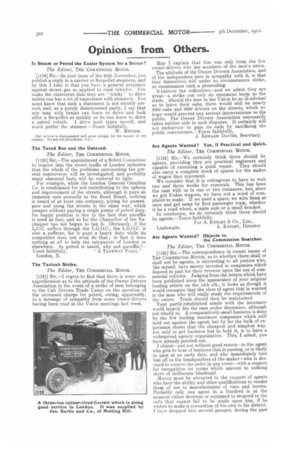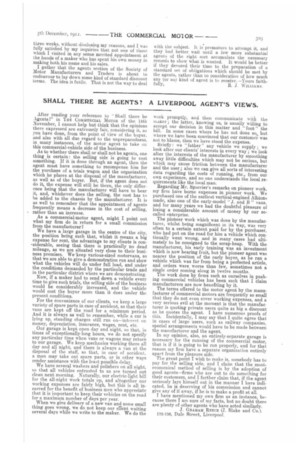Opinions from Others.
Page 16

Page 17

If you've noticed an error in this article please click here to report it so we can fix it.
Is Steam or Petrol the Easier System for a Driver?
The Editor, THE COMMERCIAL MOTOR.
[1119] Sir,—In your issue of the 28th November, you publish a reply to a carrier re Serpollet steamers, and by this I take it that you have a general prejudice against steam gas as applied to road vehicles. You make the statement that they are " tricky " to drive unless one has a lot of experience with steamers. You must know that such a statement is not strictly correct, and, as a purely disinterested party, I say that any man with brains can learn to drive and look after a Serpollet as quickly as he can learn to drive a petrol vehicle. I drive both types myself, and tnuch prefer the steamer.—Yours faithfully,
W. METEOR.
Our alviee is disinterested and given always for the benefit of our readers. We are not rejudieed.--Eu.1
The Taxed Bus and the Untaxed.
The Editor, THE COMMERCIAL MOTOR.
[1120] Sir,—The appointment of a Select Committee to inquire into the street traffic of London indicates that the whole of the problems surrounding the present controversy will be investigated, and probably many obscured facts will be restored to light. For example, while the London General Omnibus Co. is condemned for not contributing to the upkeep and improvement of the streets, although it pays an immense sum annually to the Road Board, nothing is heard of at least one company, plying for passengers and using the streets in the same way, which escapes without paying a single penny of petrol duty. Its happy position is due to the fact that paraffin is used as fuel, and so far the Chancellor of the Exchequer has not begun to tax iL Obviously, if the L.C.C. suffers through the L.G.O.C., the L.G.O.C. is also a sufferer, for it pays a heavy duty while its competitor does not even do that ; in fact it does nothing at all to help the ratepayers of London or elsewhere. As petrol is taxed, why not paraffin ?— Yours faithfully, •• A TRAMWAY POINT." London, N.
The Taxicab Strike.
The Editor, THE COMMERCIAL MOTOR.
[1121] Sir,—I regret to find that there is some misapprehension as to the attitude of the Owner Drivers
Association in the event of a strike of men belonging to the Cab Drivers Trade Union on the question of the increased charge for petrol, owing, apparently, to a message of sympathy from some owner-drivers having been read at the Union meetings last week. May I explain that this was only from, the few owner-drivers who are members of the men's union.
The attitude of the Owner Drivers Association, and of the independent men in sympathy with it, is that they themselves will under no circumstances strike, or countenance such a proceeding. hatever the difficulties—and we admit they are great—a strike can only do enormous harm to the trade. Should the men in the Union be so ill-advised as to leave their cabs, there would etill be nearly 2000 cabs and 3000 drivers on the streets, which we hope would prevent any serious inconvenience to the public. The Owner Drivers Association necessarily takes neither side in such disputes. It certainly will not endeavour to gain its ends by sacrificing the public convenience.—Yours faithfully, J. EDWARD DAVIES, Secretary.
Are Agents Wanted ? Yes, if Practical and Quick. The Editor, THE COMMERCIAL MOTOR U122] Sir,—We certainly think there should be agents, providing they are practical engineers and capable of executing a quick repair. They should also carry a complete stock of spares for the makes of wagon they represent.
We consider that it is outrageous to have to wait two and three weeks for renewals. This has been the ease with us in one or two instances, but, since we got Foden wagons, we have not a word of complaint to make. If we need a spare, we wire them at • once and get same by first passenger train, whether it be a road wheel, a main axle or a small bracket. In conclusion, we do certainly think there should be agents.—Yours faithfully, For A. KNIGHT & CO., LTD., Linthwaite. A. KNIGHT, Director Are Agents Wanted? Objects to the Commission Snatcher.
The Editor, THE COMMERCIAL MOTOR.
[1123] Sir,—The correspondence in recent issues of THE COMMERCIAL MOTOR, FLA to whether there shall or shall not be agents, is interesting to all parties who, like myself, have money invested in companies which depend in part for their revenue upon the use of commercial vehicles. Judging from the letters which have been published since the appearance of your original leading article on the 14th ult., it looks as though it would transpire that the class of agent that is wanted is the man who will really study the requirements of the owner. Trade should then be maintained.
Your partly-established simile with the insurance world largely fits the case under discussion, although not wholly so. A comparatively-small business is done by the few leading insurance companies which still hold out against the agent, but by far the bulk of experience, shows that the cheapest and simplest way, not only to get business but to hold it, is to have a widespread agency organization. This, I admit, you have already pointed out. I object—and not without good reason—to the agent who gets to hear of business that is passing, or is likely to pass at an early date, and who immediately hies him off to the headquarters of the maker—who is destined to receive the order in any event—with a request for recognition on terms which amount to nothing short of deliberate blackmail.
Money must be attracted to the support of agents who have the ability and other qualifications to render them of use to manufacturers of vans and lorries. Probably only one agent in a hundred is at the moment either desirous or equipped to respond to the calls that cannot fail to be made upon him, if he wishes to make a connection of his own in his district. I have dropped into several garages, during the past three weeks, without disclosing my reasons, and I was fully satished by my inquiries that not one of those which I visited in any sense merited appointment at the handa of a maker who has spent his own money in making both his name and his sales.
I gather that the agents section of the Society of Motor Manufacturers and Traders is about to endeavour to lay down some kind of standard discount terms. The idea is futile. That is not the way to deal with the subject. It is premature to attempt it, and they had better wait until a few more substantial agents of the right, sort accumulate the necessary records to show what is wanted. It would be better if they devoted their time to the preparation of a standard set of obligations which should be met by the agents, rather than to consideration of how much any (or no) kind of agent is to receive.—Yours faith
fully, R. J. WILLIAMS.


























